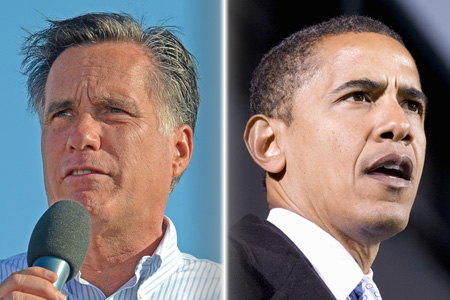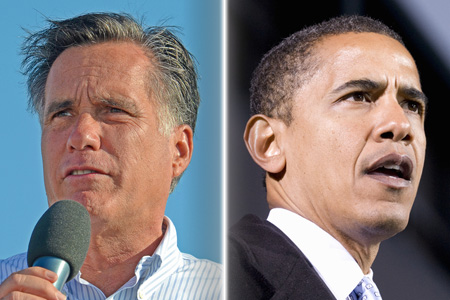A coalition of science organizations put forth a series of questions to the two leading presidential candidates, ranging from climate to water to space. And in a somewhat unexpected twist, they got answers.

The two people being discussed. Not sure which is which. (Photos by Shutterstock.)
There is only one thing in the lot that’s at all surprising, that strays remotely from the public platforms of either party. That’s Mitt Romney’s answer on climate change, which begins:
I am not a scientist myself, but my best assessment of the data is that the world is getting warmer, that human activity contributes to that warming, and that policymakers should therefore consider the risk of negative consequences.
And then he starts the next sentence with “However.” There’s no point in curbing emissions, he argues, given China’s greenhouse gas output and the theoretical impact on manufacturing jobs that would come from increasing the cost of carbon pollution.
BoingBoing’s Maggie Koerth-Baker has a good overview of the responses, noting:
Mitt Romney has apparently moved on to acknowledging that climate change is happening — while simultaneously overplaying the uncertainty surrounding specific risks, and claiming that even if climate change is a big problem there’s nothing we can really do about it anyway … because China. …
Climate scientists, and the journalists who write about them, have been talking, anecdotally, about seeing this exact rhetorical shift happening in conservative circles. It seems that the Republican presidential nominee is now one of the people who acknowledge climate change exists, but would still rather not take any decisive steps to deal with it.
But Romney does say he’d take some action.
I support robust government funding for research on efficient, low-emissions technologies that will maintain American leadership in emerging industries. And I believe the federal government must significantly streamline the regulatory framework for the deployment of new energy technologies, including a new wave of investment in nuclear power.
Which, if you’re an optimist, you could read as his supporting R&D funding for other renewable energy technology. Minus his “I am not a scientist” schtick up front, the answer reads something like classic 2004 Romney. Retro-Romney. Retromney.
On everything else — including energy, water, food, natural resources — both candidates hew pretty closely to the positions you’d expect. (Including the president trying to balance “clean coal” fiction with investment in renewables and Romney mentioning the latter only in passing.)
It’s a unique document, if not an unsurprising one. Its real value may very well come in the future, allowing us to hold a President Obama or President Romney accountable to these stated positions.
After all, now that they’re on record, they can never reverse positions. That’s how politics works.



